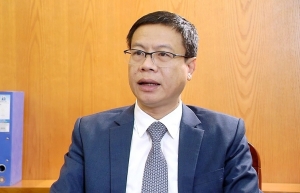Policies bringing new prospects for sci-tech market
 |
| Le Xuan Dinh-Deputy Minister of Science and Technology |
During 2022, the sci-tech sector focused on innovation and legal documents for socioeconomic development and international integration. In particular, the sector submitted documents related to the application of biotechnology and the amended intellectual property (IP) law, as well as a plethora of legal decrees, decisions, directives, and circulars.
Last year, the ministry also submitted the sci-tech and innovation development strategy to 2030, which contributes to turning Vietnam into a developing country with modern industry and high average income, as well as developing society, ensuring national defence, and protecting the environment.
The ministry also proposed amendments to the Law on Science and Technology, the Law on Product and Goods Quality, the Law on Standards and Technical Regulations, and the Law on Atomic Energy.
Sci-tech has promoted the development of sectors and industries such as agriculture, healthcare, national defence, banking, and more. For instance, in the high-tech industry, key technologies of Industry 4.0 have been studied such as AI, the Internet of Things, 3D printing, and VR.
During 2022, other works included developing the sci-tech market, increasing technology application and transfer, and stepping up support for the national innovative startup ecosystem.
Accordingly, the ministry worked on policies to create a competitive driving force to encourage enterprises to participate in the sci-tech market; a mechanism to link the market with those of finance, labour, and goods and services; a mechanism to promote university-enterprise cooperation; and a commercialisation policy to quickly publish results of research and development (R&D), and IP research.
The ministry continues to support businesses in technology innovation and manufacturing activities, assess the technological level of enterprises in several industries, and organise activities to support the development of technology supply and demand.
Vietnam’s innovative startup ecosystem has developed, creating a new generation of enterprises that do business based on IP and can access the global market. In 2022, Vietnam’s innovative startup ecosystem was ranked 54th out of 100 countries worldwide by StartupBlink, a global startup ecosystem and research centre, up five places from a year earlier.
Despite the achievements, there are still shortcomings. The policies for promoting the development of sci-tech and innovation remain problematic, incomplete, and asynchronous. The commercialisation of research is still facing many difficulties.
Collaboration among research institutes, universities, and businesses aiming to bring sci-tech R&D into practical business activities remains limited. Worse still, the sci-tech market is still slowly developing. Meanwhile, the application of technology and innovation among businesses is yet to be effective.
Looking forward, the ministry has set out goals and tasks for 2023 and beyond. It will continue to renovate the organisation, financial mechanism, management, and autonomy mechanism of public sci-tech organisations per the characteristics of sci-tech activities; complete policies and legal documents on the issue; and take risks in science research according to international practices while ensuring the principles of openness, transparency, and fairness.
In addition, it will focus resources on research, transferring, and applying advanced sci-tech for sustainable socioeconomic development, ensure security and defence, and focus on basic research, application orientation, and attract social resources.
It will do this while fostering the development of a national innovation system in which enterprises are at the centre, research institutes and universities are research subjects, and international cooperation will be strengthened.
The ministry aims that science, technology, and innovation play their role in the development of key industries such as the processing industry and renewable energy, thus making an important contribution to restructuring the economy and modernisation.
It aims to increase the country’s Global Innovation Index standing; promoting the mobilisation of varied resources to increase investment in developing the potential of science and technology so that by 2025, investment in this area will reach 12-15 per cent of GDP. Of which, total national expenditure on scientific research and technological development reaches 0.8-1 per cent. It also strives to have 25-30 sci-tech organisations ranked worldwide.
The number of patent applications and patent protection titles is aimed to increase by at least 12-14 per cent a year; and development of national quality infrastructure to meet the requirements of increasingly international integration on quality needs to enter the top 50 countries in the world.
To complete the key tasks for the next few years, it will complete legal policies on science, technology, and innovation to meet the new requirements. Specifically, it will build and submit to the government and the National Assembly the amendments to the four aforementioned laws.
The ministry will continue to innovate the management mechanism and financial management methods of sci-tech programmes and tasks to reduce administrative procedures, accept risks in scientific research, and solve difficulties in handling assets from sci-tech tasks using the state budget.
It will also build specific policies to prioritise resources for science, technology, and innovation for products and services, making them the main drivers of economic growth, and develop a mechanism and propose the deployment of a sandbox for scientific research.
In 2023, the ministry will focus on building and submitting a pilot scheme on the policy for commercialising research results and IP generated from the state budget to quickly put them into production.
It will also complete policies to attract domestic and international investment resources, effectively implement the national strategy on sci-tech and innovation development, increase core technology capacity, promote quality products, and take advantage of Industrial 4.0.
The ministry will also continue to take measures to develop the sci-tech market in a more efficient and modern manner, strengthen checks and inspections into related activities and those using state funding, and promote the development of e-government towards a digital government in association with administrative reform.
 | Special policies to attract investment in sci-tech The Ministry of Science and Technology is drafting policies and working out the kinks in the newest public-private partnership mechanism to encourage investment in science and technology. Deputy Minister Le Xuan Dinh talked with Bich Thuy the special mechanisms for investment attraction that will be made available soon. |
 | Building PPP mechanisms in sci-tech venture investment Vietnam’s sci-tech market has seen improvements in business and investment activities, but more efforts are urged to keep up with international trends. Tran Van Tung, Deputy Minister of Science and Technology, talked to VIR’s Minh Anh about the solutions to move forward. |
 | Sci-tech innovations at heart of green goals Mobilising private investment in sci-tech and innovation development should be strengthened towards sustainable development goals, experts said. With that, Vietnam is required to be bold and experiment with policies to attract more investment from the private sector. |
What the stars mean:
★ Poor ★ ★ Promising ★★★ Good ★★★★ Very good ★★★★★ Exceptional
Related Contents
Latest News
More News
- Masan Consumer names new deputy CEO to drive foods and beverages growth (February 23, 2026 | 20:52)
- Myriad risks ahead, but ones Vietnam can confront (February 20, 2026 | 15:02)
- Vietnam making the leap into AI and semiconductors (February 20, 2026 | 09:37)
- Funding must be activated for semiconductor success (February 20, 2026 | 09:20)
- Resilience as new benchmark for smarter infrastructure (February 19, 2026 | 20:35)
- A golden time to shine within ASEAN (February 19, 2026 | 20:22)
- Vietnam’s pivotal year for advancing sustainability (February 19, 2026 | 08:44)
- Strengthening the core role of industry and trade (February 19, 2026 | 08:35)
- Future orientations for healthcare improvements (February 19, 2026 | 08:29)
- Infrastructure orientations suitable for a new chapter (February 19, 2026 | 08:15)

 Tag:
Tag:




















 Mobile Version
Mobile Version